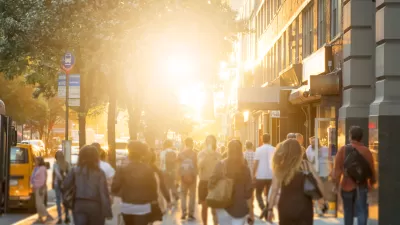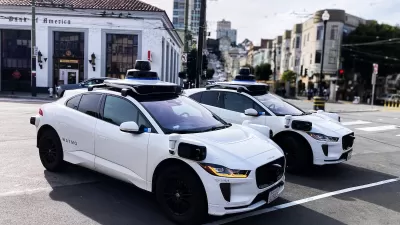Every so often, I read something describing defenders of sprawl as "contrarians", implying that they are underdogs fighting against the elitist, anti-sprawl Establishment. For example, when I did a google.com search for sites including Robert Bruegmann (author of one of the better defenses of the status quo) and the word "contrarian" I found over 1400 "hits." Similarly, a search for websites using the terms "smart growth" and "elitist" yielded over 6000 hits. But realistically, most of the U.S. built environment is sprawl by any concievable definition. So how can it be "contrarian" to defend the status quo?
Every so often, I read something describing defenders of sprawl as "contrarians", implying that they are underdogs fighting against the elitist, anti-sprawl Establishment. For example, when I did a google.com search for sites including Robert Bruegmann (author of one of the better defenses of the status quo) and the word "contrarian" I found over 1400 "hits." Similarly, a search for websites using the terms "smart growth" and "elitist" yielded over 6000 hits.
But realistically, most of the U.S. built environment is sprawl by any concievable definition. So how can it be "contrarian" to defend the status quo?
Moreover, numerous wealthy corporate elites are quite invested in this status quo, and give generously to politicians to ensure that nothing changes - most notably the road-building industry and large chunks of the real estate development industry. Other well-heeled industries (such as the tire, auto and oil industries) also benefit from the status quo to some extent.* Although the majority of planning academics may support less sprawling development, they control few dollars and fewer votes. If "elitism" means favoring wealthy corporations, supporters of sprawl are true elitists. And if "elitism" means disenfranchising the poor and the disabled, supporters of sprawl are the true elitists, since automobile-dependent development keeps jobs away from people too poor or too disabled to drive.
To draw an analogy: imagine a country called "Turkonesia" where most people (and most political donors) were Muslims. Unlike the most headline-grabbing Islamic nations, the nation is peaceful and more or less democratic. But in Turkonesia, most of daily life is structured to benefit Muslims; Muslims have more schools, those schools are located in more desirable areas, and many major employers are not close to any non-Muslim neighborhoods. Some employers are so far away from non-Muslim areas as to be almost inaccessible. Jewish and Christian neighborhoods tend to be either dangerous or very expensive. Although politicians are responsive to Judeo-Christian interests, Muslim interests come first, and when government subsidies are scarce, those most of interest to Jews and Christians tend to be squeezed out first. Even if most of the nation's intellectuals were Jews or Christians, it would make no sense to describe Muslims as rebels or contrarians. Clearly, Turkonesia functions better for Muslims than for everyone else.
If one substitutes "drivers" and/or "pro-sprawl lobbies" for Muslims and "nondrivers" and/or "sprawl critics" for "Jews/Christians", Turkonesia is pretty similar to the United States. Just as Islam is the easier choice for Turkonesians wishing to get ahead, sprawl and driving are the default choices for most Americans. Just as Judeo-Christian neighborhoods in Turkonesia tend to be either socially troubled or expensive, pedestrian-oriented neighborhoods in many American cities tend to be troubled or expensive.
Surely, someone wishing to bolster Muslim domination of Turkonesia would not be a "contrarian". And someone defending the interests of Turkonesia' religious minorities would hardly be "elitist." Similarly, the real contrarians and anti-elitists are those who dare to fight the sprawl status quo.
*To be sure, environments are quite critical of sprawl - but to them, sprawl is just one of many environmental issues.

Alabama: Trump Terminates Settlements for Black Communities Harmed By Raw Sewage
Trump deemed the landmark civil rights agreement “illegal DEI and environmental justice policy.”

Study: Maui’s Plan to Convert Vacation Rentals to Long-Term Housing Could Cause Nearly $1 Billion Economic Loss
The plan would reduce visitor accommodation by 25% resulting in 1,900 jobs lost.

Planetizen Federal Action Tracker
A weekly monitor of how Trump’s orders and actions are impacting planners and planning in America.

Waymo Gets Permission to Map SF’s Market Street
If allowed to operate on the traffic-restricted street, Waymo’s autonomous taxis would have a leg up over ride-hailing competitors — and counter the city’s efforts to grow bike and pedestrian on the thoroughfare.

Parklet Symposium Highlights the Success of Shared Spaces
Parklets got a boost during the Covid-19 pandemic, when the concept was translated to outdoor dining programs that offered restaurants a lifeline during the shutdown.

Federal Homelessness Agency Places Entire Staff on Leave
The U.S. Interagency Council on Homelessness is the only federal agency dedicated to preventing and ending homelessness.
Urban Design for Planners 1: Software Tools
This six-course series explores essential urban design concepts using open source software and equips planners with the tools they need to participate fully in the urban design process.
Planning for Universal Design
Learn the tools for implementing Universal Design in planning regulations.
Caltrans
Smith Gee Studio
Institute for Housing and Urban Development Studies (IHS)
City of Grandview
Harvard GSD Executive Education
Toledo-Lucas County Plan Commissions
Salt Lake City
NYU Wagner Graduate School of Public Service






























